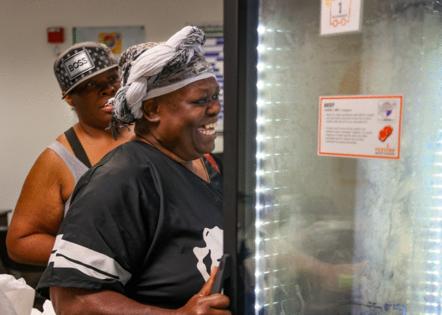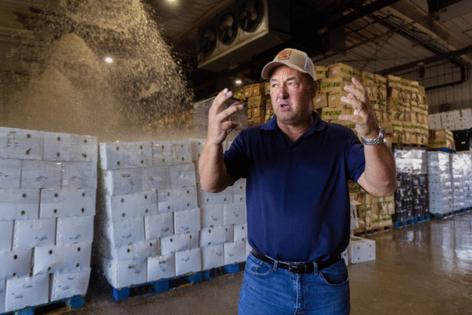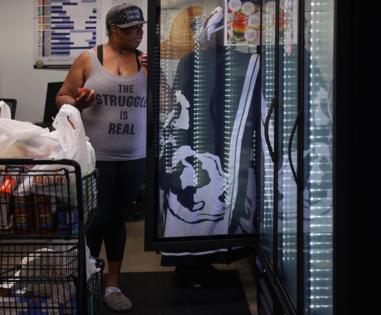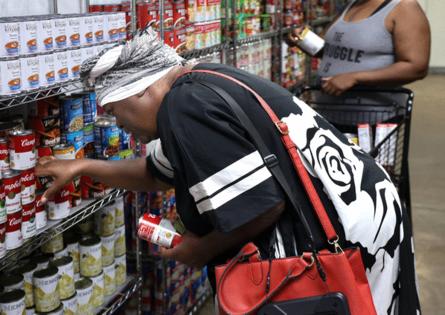A federal program sent farmers' fresh produce to food banks. It's being cut
Published in Lifestyles
MIAMI — Stew — a big pot of it — with onions, potatoes and bell peppers. Maybe a little bit of meat, if they’re lucky, Jackie Brown muttered, chewing over potential dinner ideas for her family as she surveyed the produce refrigerator at the Feeding South Florida food bank in Pembroke Park on a recent afternoon. She was planning a week of meals for herself and the five grandchildren she’s raising, all big eaters, and needed something hearty that would also yield leftovers.
Brown, 59, is one of the 1.2 million South Floridians who relied on Feeding South Florida, the region’s largest food bank, last year to supplement their groceries. As rising costs of living have nudged more locals into greater financial precariousness and closer to hunger, the organization reported that nearly two in 10 South Floridians turned to it last year for food.
But recent federal funding cuts mean Feeding South Florida’s budget is about to shrink by more than 30%.
As part of its push to reduce federal spending, the Trump administration shuttered the Local Food Purchase Assistance Cooperative Agreement Program (LFPA), a $900 million initiative started in 2021 to help food banks purchase produce from local farmers. In doing so, it lopped $13.5 million — nearly all of the food bank’s federal funding — from Feeding South Florida’s budget.
That means fewer vegetables on the table for families like Brown’s, and fewer orders for the farmers who grow them.
▪ ▪ ▪
Particularly toward the end of the month, Brown relies on food banks like Feeding South Florida to put meals on the table.
“That’s what I use the food bank for,” she said, “to fill in that last week of the month before I get more [food stamp] assistance.”
Like many across the country, and especially in South Florida, her household has felt the squeeze of rising prices. U.S. Department of Agriculture data shows grocery prices have jumped roughly 30% since 2020.
Over the same period of time, Miami-Dade’s rate of food insecurity — people who don’t have enough to eat — has spiked by 50%. On any given day, roughly 400,000 Miamians, 15% of the county’s population, don’t know where their next meal will come from.
Compounding that vulnerability are proposed major cuts to federal spending on food assistance programs like the Supplemental Nutrition Assistance Program (SNAP), better known as food stamps, on which nearly 3 million Floridians, including Brown and her five grandchildren, rely.
For Brown’s family and others that are either food insecure or close to it, food banks have become especially important for ensuring access to fresh fruits and vegetables.
The local produce purchase program is largely to thank. Feeding South Florida estimates that nearly half of its produce is purchased with money from the program. Without the funding, the food bank told the Miami Herald it anticipates “a reduction in both the volume and variety of fresh foods available” at its food banks and that its “capacity to provide nutritious food will be significantly affected.”
Robin Safley, the CEO of Feeding South Florida’s umbrella organization, Feeding Florida, emphasized the economic importance of guaranteeing access to healthy, fresh food.
Those served by her organization’s affiliate food banks disproportionately deal with chronic health issues, including diabetes, said Safley. “Many of them are also on Medicaid,” she noted, “so those chronic conditions can really drive up the cost of health care.” Healthy eating plays a critical role in mitigating those costs, she added.
But beyond those health impacts, Safley pointed out that the program has given local farmers more opportunities to sell produce in their home communities.
▪ ▪ ▪
At his farm in Palm Beach County, J.D. Poole shouted over the sound of water raining from pipes affixed to the ceiling, cooling boxes of freshly picked corn below.
A third-generation farmer from Belle Glade, Poole co-founded Scotlynn Sweet-Pac Growers in 2012. Still based in Belle Glade, the company plants, harvests and ships thousands of acres of sweet corn, pumpkins, cabbage, watermelon and asparagus each year.
Thanks to the federal food purchase initiative, from which Florida received and dispersed more than $20 million to food banks last year, Feeding South Florida has been a major buyer from Poole. He estimates his farm sends more than 1 million pounds of produce each year down to the food bank, which purchases those orders with money from the program. Poole said the arrangement accounts for roughly 10% of Sweet-Pac Growers’ annual revenue.
The program was particularly helpful for selling perfectly good produce that grocery stores wouldn’t buy because of slight aesthetic imperfections, he added. “Rather than walk away and take a huge financial loss” on those vegetables, the program helped his business recoup planting investments that otherwise would’ve been lost, while at the same time “providing really good, fresh food at a reasonable cost to the needy.” If not for the program, that produce would’ve been thrown out.
That’s what will likely happen now. He was grateful to provide for those in need, but Poole says he can’t afford to harvest, process, package and ship his produce to food banks on his own dime.
He hopes the president will reconsider the program’s termination. A Trump voter, Poole is generally content with the administration thus far. And he backs Trump and the Department of Governmental Efficiency’s (DOGE) purported efforts to eliminate the “fluff” in government spending. But, he said, this initiative is not fluff. “It’s a very needed program.”
Poole is far from alone in the agriculture community in his assessment. Aaron Shier, the government relations director at the National Farmers Union, a D.C.-based advocacy group, said the program has been important for many community farmers and strengthened local food supply chains, all while feeding people in need.
U.S. Rep. Debbie Wasserman-Schultz, a Florida Democrat who sits on the House Appropriations Committee’s agriculture subcommittee, described the program as a “win-win for our local farmers and for families in need.” Its cancellation is a “gut punch,” she told the Herald, especially for small farmers and food-insecure people.
People like Brown. The grandmother’s disability benefits and SNAP assistance alone aren’t enough for her to provide for her dependent grandchildren, whose mother died and whose father isn’t in the picture.
But Brown, turning to her friend Lathoya Bennett, said she feels lucky. “Lots of people, lots of homeless people, can’t even get here to get [this food]. We really need more of this.”
Bennett nodded as she looked over the piles of carrots and onions: “This is really a blessing.”
____
This story was produced with financial support from supporters including The Green Family Foundation Trust and Ken O’Keefe, in partnership with Journalism Funding Partners. The Miami Herald maintains full editorial control of this work.
©2025 Miami Herald. Visit miamiherald.com. Distributed by Tribune Content Agency, LLC. ©2025 Miami Herald. Visit at miamiherald.com. Distributed by Tribune Content Agency, LLC.































Comments